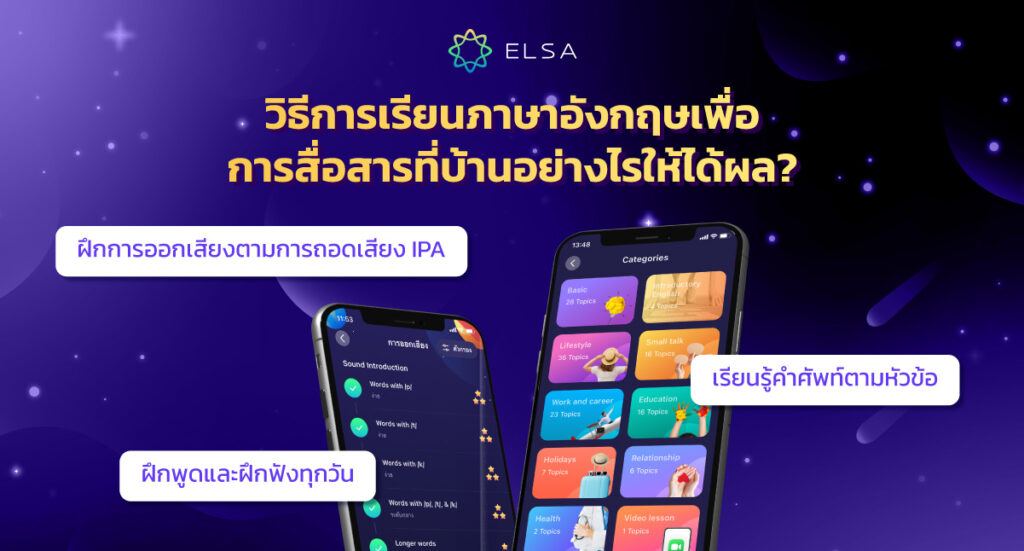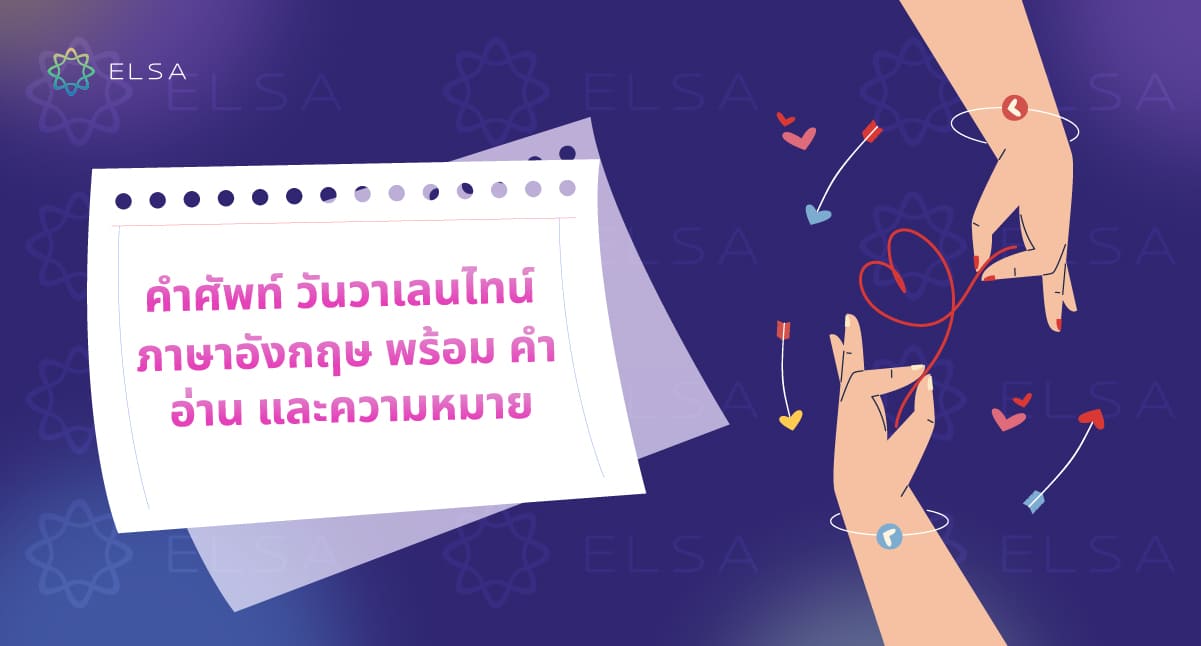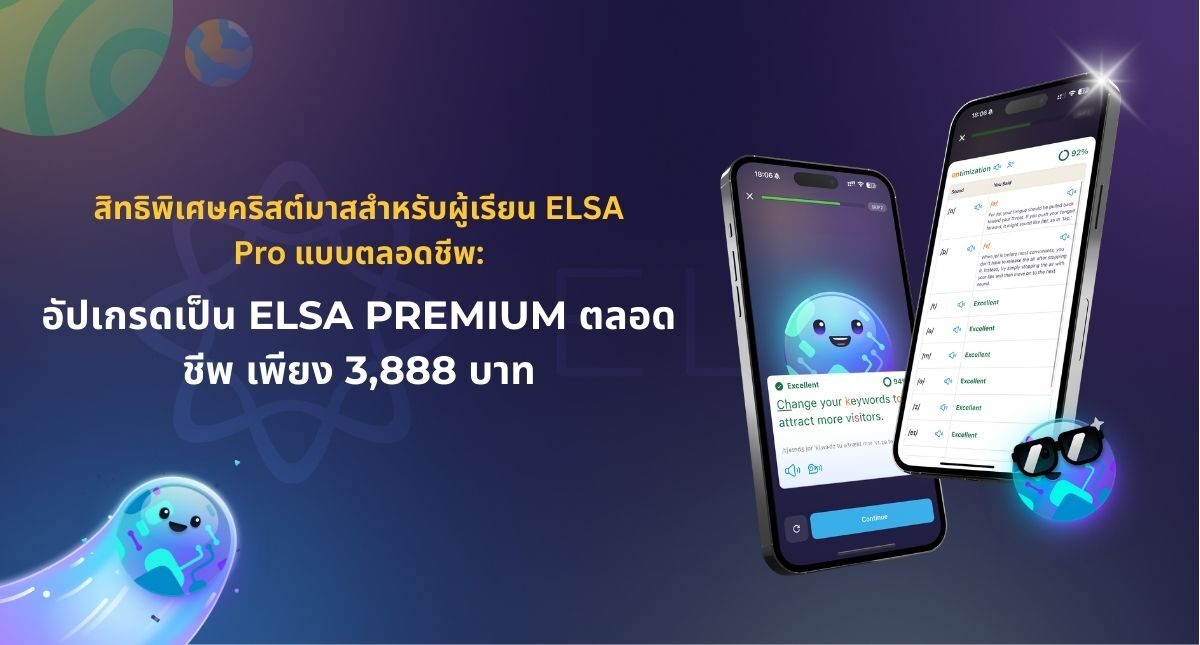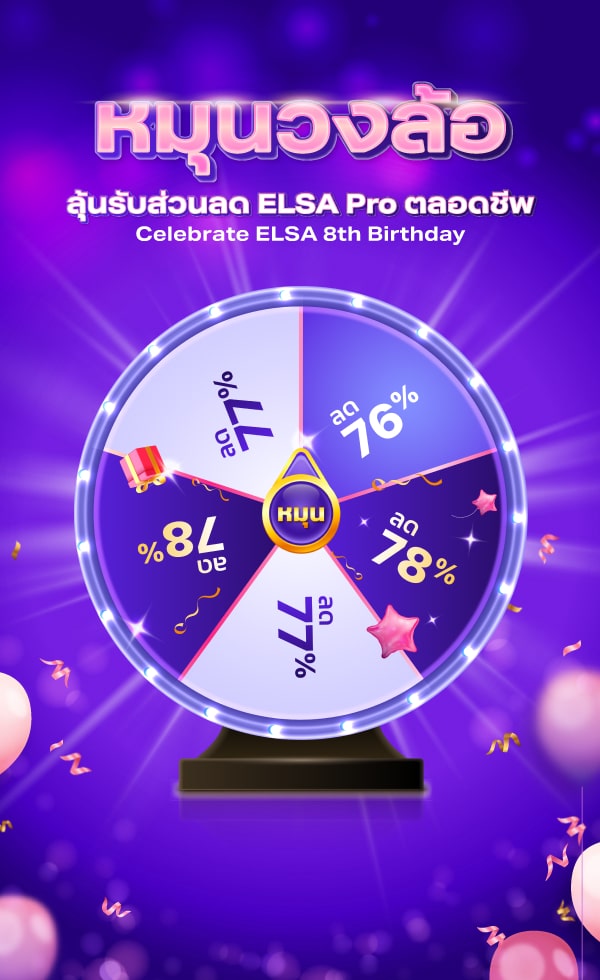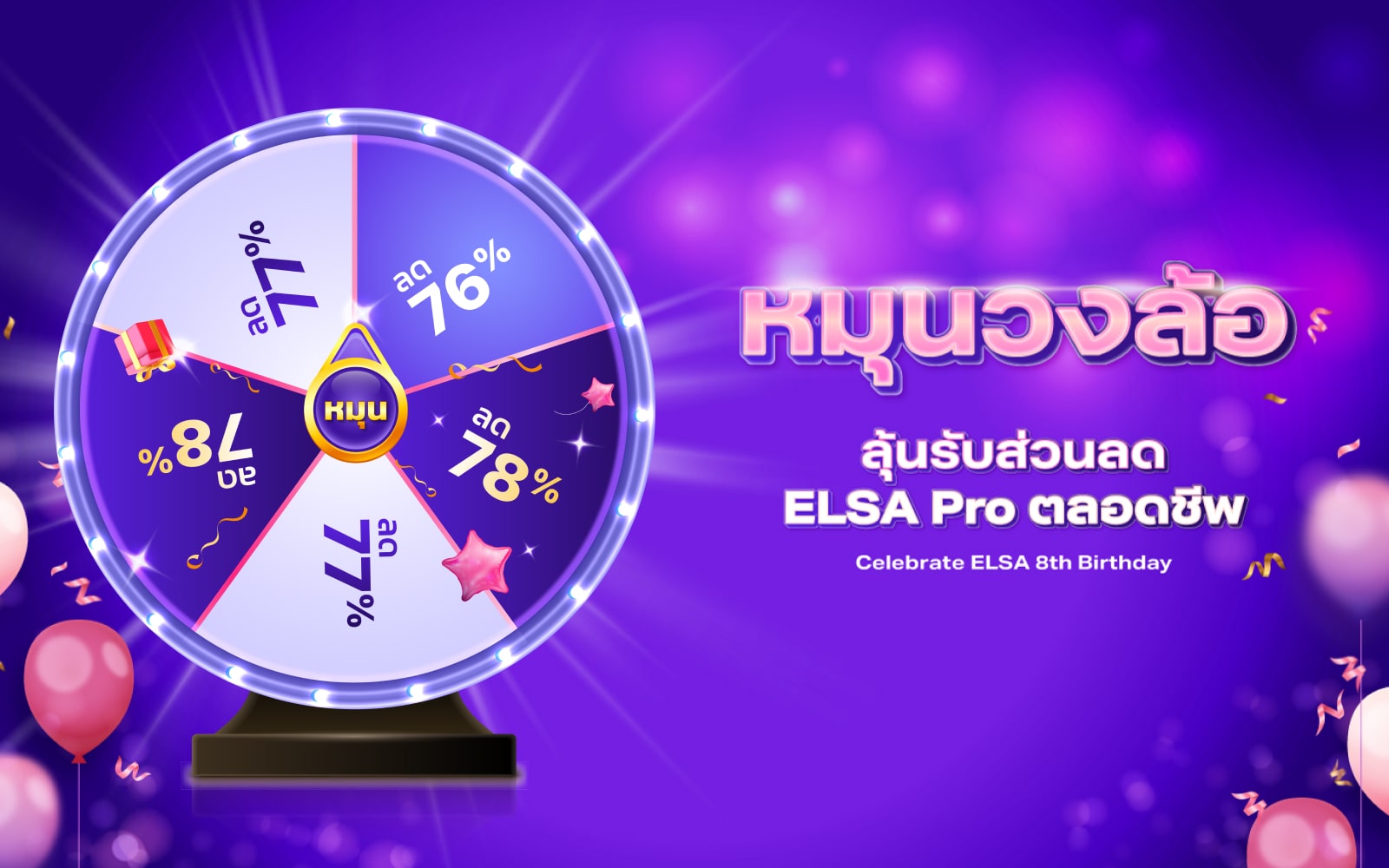Reported Speech คือ อะไร
Indirect Speech หรือที่เรียกว่า Reported Speech คือเป็นประโยคที่ใช้เมื่อเราต้องการเล่าหรือเล่าประโยคที่คนอื่นพูด
ตัวอย่างเช่น ลิซ่าพูดประโยคต่อไปนี้:
สอบก่อนเข้าฟรี

เรามี 2 วิธีในการเล่าให้คนอื่นรู้ว่า ลิซ่าพูดอะไร:
- ทำซ้ำตามที่ลิซ่าพูดทุกประการ: Lisa said, ‘I’m tired.’ = ลิซ่าบอกว่า ‘ฉันเหนื่อย’
- หรือเล่าคำพูดของลิซ่า: Lisa said that she was tired. = ลิซ่าบอกว่าเธอเหนื่อย
→ แบบนี้เรียกว่า Reported Speech
วิธีเปลี่ยน Direct Speech เป็น Reported Speech
บทสรุป
4 ขั้นตอนในการเปลี่ยนจากประโยค Direct Speech เป็น ประโยค Reported Speech:
ขั้นตอนที่ 1: เลือกคำ Reporting Verb: said, told,…
ขั้นตอนที่ 2: เปลี่ยนรูป tense ของคำกริยาปัจจุบันให้เป็นอดีต
ขั้นตอนที่ 3: เปลี่ยนสรรพนามและคำคุณศัพท์แสดงความเป็นเจ้าของ
ขั้นตอนที่ 4: เปลี่ยนคำที่บ่งบอกสถานที่และเวลา
อย่างที่คุณเห็นด้านบนแล้ว ประโยค Direct Speech และ Indirect Speech นั้นแตกต่างกันมาก ประโยค Direct Speech ที่ลิซ่าพูดคือ I’m tired แต่ประโยคที่เราเล่าคือ Lisa said that she was tired
มาเรียนรู้การเปลี่ยน Direct Speech เป็น Reported Speech ใน 4 ขั้นตอนพร้อมตัวอย่างกันนะ!
สมมติว่า เราได้ยินคุณทอมพูดว่า:
I want to see this movie with my girlfriend tomorrow.
ผมอยากดูหนังเรื่องนี้กับแฟนผมในวันพรุ่งนี้
ขั้นตอนที่ 1: เลือกคำ Reporting Verb
เพื่อจะเล่าประโยคที่คนอื่นพูด เราจะพูดว่า “เขาบอกว่า…” หรือ “เธอบอกว่า…”
ในภาษาอังกฤษ เรามักจะใช้คำกริยา 2 คำ ได้แก่ said (รูปอดีตกาลของ say ซึ่งหมายถึงว่า พูด/บอก) และ told (รูปอดีตกาลของ tell ซึ่งหมายถึงว่า บอกใครสักคน)
- Tom said that…
ทอมบอกว่า…
- Tom told Kelly that…
ทอมบอกเคลลี่ว่า…
ตัวอย่าง 2 ประโยคข้างต้นยังแสดงให้เห็นความแตกต่างระหว่าง said และ told ก็คือ
- คำว่า told ที่บังคับใช้เมื่อเราต้องการเล่าว่า ทอมพูดกับคนอื่น
- ถ้าเราไม่อยากพาดพิงถึงคนนี้ เราก็ใช้คำว่า said
นอกจาก said และ told แล้ว เรายังสามารถใช้คำอื่นๆ เพื่ออธิบายลักษณะของคำพูดได้ดียิ่งขึ้น เช่น
- asked = ถาม
- denied = ปฏิเสธ
- promised = สัญญา
- suggested = แนะนำ
- และอีกหลายคำ
อย่างไรก็ตาม คำเหล่านี้มักไม่ใช้โครงสร้าง said that หรือ told somebody that แต่จะใช้โครงสร้าง V-ing หรือ To + Verb อย่างเช่น ask someone + To Verb หรือ denied + V-ing
ในบทเรียนนี้ เพื่อทำความคุ้นเคยกับ Reported Speech คุณเพียงแค่ต้องจำคำ 2 คำคือ said และ told ก็พอแล้ว หากคุณต้องการเรียนรู้เพิ่มเติมเกี่ยวกับคำเหล่านี้ คุณสามารถศึกษาได้ในบทเรียน V-ing และ To Infinitive!
นอกจากนี้ เช่นเดียวกับภาษาไทย เรามักจะตัดคำ ว่า เพื่อให้ประโยคมีความกระชับมากขึ้น ในภาษาอังกฤษเราก็สามารถละคำ that ได้เช่นกัน
- Tom said that… = Tom said…
ทอมบอกว่า… = ทอมบอก…
ด้วยความรู้ข้างต้น Reported Speech ระหว่างกาลของขั้นตอนนี้คือ
I want to see this movie with my girlfriend tomorrow.
→ Tom said that I want to see this movie with my girlfriend tomorrow.
ขั้นตอนที่ 2: เปลี่ยนรูป tense ของคำกริยาใน Direct Speech ให้เป็นอดีต
เพื่อแสดงว่า คำพูดนั้นเป็นอดีตแล้วและอาจจะไม่เป็นความจริงในปัจจุบัน เราจำเป็นต้องเปลี่ยนคำกริยาใน past tense การดำเนินการนี้มักเรียกว่า “การเปลี่ยนรูป tense”
เราจะ “เปลี่ยนรูป tense” โดยทั่วไป ดังนี้
- Present Simple Tense → Past Simple Tense
- Simple Future Tense → Simple Future Tense ในอดีต
- Past Simple Tense → Past Perfect Tense
ดังต่อไปนี้
| Direct Speech | Reported Speech |
| Present Simple Tense | Past Simple Tense |
| Present Continuous Tense is/are working | Past Continuous Tense was/were working |
| Present Perfect Tense have/has worked | Past Perfect Tense had worked |
| Present Perfect Continuous Tense have/has been working | Past Perfect Continuous Tense had been working |
| Simple Future Tense will work | Simple Future Tense (ในอดีต) would work |
| Future Continuous Tense will be working | Future Continuous Tense (ในอดีต) would be working |
| Future Perfect Tense will have worked | Future Perfect Tense (ในอดีต) would have worked |
| Future Perfect Continuous Tense will have been working | Future Perfect Continuous Tense (ในอดีต) would have been working |
| Past Simple Tense worked | Past Perfect Tense had worked |
| Past Continuous Tense was/were working | Past Perfect Continuous Tense had been working |
| Past Perfect Tense had worked | Past Perfect Tense (คงเดิมเพราะเปลี่ยนรูป tense อีกไม่ได้) had worked |
| Past Perfect Continuous Tense had been working | Past Perfect Continuous Tense (คงเดิมเพราะเปลี่ยนรูป tense อีกไม่ได้) had been working |
ส่วน modal verb จะถูกเปลี่ยน ดังนี้
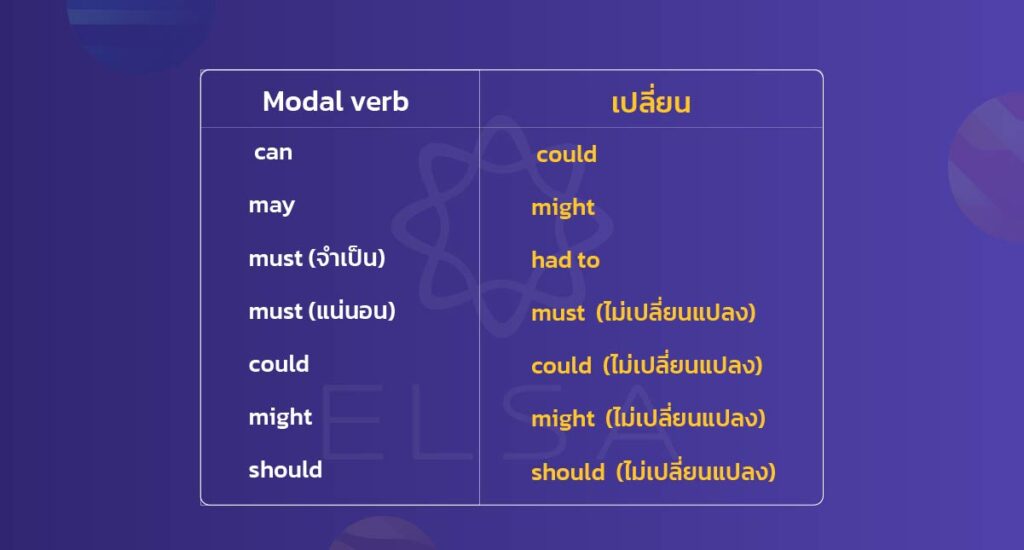
ในประโยคตัวอย่าง คำกริยา want จะเปลี่ยนเป็นรูปอดีต wanted ดังนั้น Reported Speech ระหว่างกาลของขั้นตอนนี้คือ
I want to see this movie with my girlfriend tomorrow.
→ Tom said that I wanted to see this movie with my girlfriend tomorrow.
ขั้นตอนที่ 3: เปลี่ยนสรรพนามและคำคุณศัพท์แสดงความเป็นเจ้าของ
เมื่อทอมพูดว่า “I want to see this movie with my girlfriend tomorrow”, “I” ในที่นี้หมายถึงทอมใช่ไหมล่ะ!
ดังนั้น เมื่อเราเล่าคำพูดของทอม เราจะไม่สามารถเล่าได้ว่า “I want to see this movie” เพราะ “I” ในตอนนั้นคือเรา ดังนั้นใน Reported Speech “I” ต้องเปลี่ยนเป็น “he”
เข้าใจกฎนี้ได้แล้ว เมื่อเปลี่ยน Direct Speech เป็น Reported Speech คุณจะต้องเปลี่ยนคำสรรพนามตามด้วย
ด้านล่างนี้คือตารางการเปลี่ยนคำสรรพนามใน Reported Speech คุณไม่จำเป็นต้องจำตารางด้านล่างนี้ทั้งหมด แค่เข้าใจกฎก็เพียงพอแล้ว ตารางนี้ใช้สำหรับอ้างอิงเท่านั้นในกรณีที่คุณลืม
| Direct Speech | Reported Speech |
| I | he / she |
| we | they |
| you (เอกพจน์) | he / she / I |
| you (พหูพจน์) | they |
| me | him / her |
| us | them |
| you (เอกพจน์) | him / her / me |
| you (พหูพจน์) | them |
| myself | himself / herself |
| ourselves | themselves |
| yourselfe | himself / herself / myself |
| yourselves | themselves |
ในทำนองเดียวกัน คำสรรพนามแสดงความเป็นเจ้าของและคำคุณศัพท์แสดงความเป็นเจ้าของก็จำเป็นต้องเปลี่ยนเช่นกัน
| Direct Speech | Reported Speech |
| my | his / her |
| our | their |
| you (เอกพจน์) | his / her / my |
| you (พหูพจน์) | their |
| mine | his / hers |
| ours | theirs |
| you (เอกพจน์) | his / her / mine |
| you (พหูพจน์) | theirs |
ดังนั้นในประโยคตัวอย่าง I จะเปลี่ยนเป็น he และ my จะเปลี่ยนเป็น his ดังนั้น Reported Speech ระหว่างกาลของขั้นตอนนี้คือ
I want to see this movie with my girlfriend tomorrow.
→ Tom said that he wanted to see this movie with his girlfriend tomorrow.
เข้าใจแนวทางการใช้กาลต่างๆในภาษาอังกฤษอย่างมั่นคง:
- ประโยคอดีตกาลต่อเนื่อง (Past Continuous Tense): โครงสร้างและแบบฝึกหัด
- ประโยคอนาคตกาล ( Future Simple Tense ): โครงสร้างและแบบฝึกหัด
- Present Continuous Tense: โครงสร้าง หลักการใช้งาน
- Past Perfect Continuous Tense
- ประโยคปัจจุบันกาล (Present Simple Tense): โครงสร้าง การใช้งาน
- อนาคตกาลสมบูรณ์ต่อเนื่อง (Future Perfect Continuous Tense)
- Future Continuous Tense: โครงสร้างและหลักการใช้งาน
ขั้นตอนที่ 4: เปลี่ยนคำที่บ่งบอกสถานที่และเวลา
เราก็ต้องเปลี่ยนคำที่บ่งบอกสถานที่และเวลาด้วย สิ่งนี้ค่อนข้างเข้าใจง่ายได้ เพราะเมื่อเราเล่าคำพูดของคนอื่น เรามักจะไม่ได้อยู่ในสถานที่และเวลาที่คนนั้นพูดอีกต่อไป
ดังนั้น คำที่บ่งบอกสถานที่และเวลาจะได้เปลี่ยนดังนี้
| Direct Speech | Reported Speech |
| here | there |
| now | then |
| today | that day |
| tonight | that night |
| yesterday | the previous daythe day before |
| tomorrow | the following daythe next day |
| (two weeks) ago | (two weeks) before |
| last (month) | the previous monththe month before |
| next (month) | the following monththe next month |
| this | that |
| these | those |
ดังนั้นในประโยคตัวอย่าง this เปลี่ยนเป็น that และ tomorrow เปลี่ยนเป็น the following day ในที่สุด เราก็มีประโยค Reported Speech ที่สมบูรณ์ คือ
I want to see this movie with my girlfriend tomorrow.
→ Tom said that he wanted to see that movie with his girlfriend the following day.
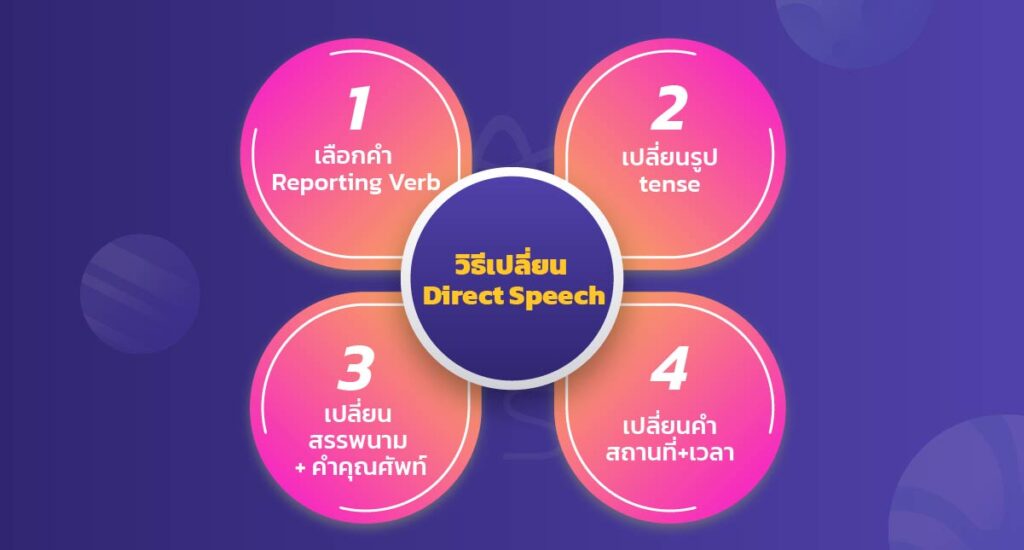
Reported Speech สำหรับคำถาม
บทสรุป
- Reported Speech สำหรับคำถามที่มีคำที่จะถาม
คล้ายกับประโยคปกติ แต่มีความแตกต่าง เช่น
- คงคำที่จะถามไว้
- เปลี่ยนตำแหน่งของหัวเรื่องและคำกริยา/กริยาช่วย
- ยังสามารถใช้โครงสร้าง To + Verb ถ้าหัวเรื่องในคำถามคือ I
- Reported Speech สำหรับคำถาม Yes/No:
คล้ายกับประโยคปกติ แต่มีความแตกต่าง เช่น
- ใช้คำ Reporting Verb: asked, wondered, wanted to know,…
- เพิ่มคำว่า if หรือ whether ก่อนคำถาม
- เปลี่ยนตำแหน่งของหัวเรื่องและคำกริยา/กริยาช่วย
Reported Speech สำหรับคำถามจะคล้ายกับ Reported Speech สำหรับประโยคปกติเหมือนข้างต้น โดยมีข้อแตกต่างเพียงเล็กน้อยเท่านั้น ดังนี้
ใช้คำ Reporting Verb ที่อื่น
หากใน Reported Speech ปกติ เราใช้คำว่า said หรือ told เพื่อหมายถึงว่า “พูด/บอก” จากนั้นใน Reported Speech สำหรับคำถาม เราจะใช้คำว่า asked, wondered หรือ wanted to know เพื่อแสดงความคิดว่า “ถาม”
- asked = ถาม
- wondered = สงสัย
- wanted to know = อยากรู้
คำถามที่มีคำที่จะถาม
สำหรับ Reported Speech คำถามที่มีคำที่จะถาม (what, who, when, where, why, how…), คุณต้อง:
- คงคำที่จะถามไว้
- เปลี่ยนตำแหน่งของหัวเรื่องและคำกริยา/กริยาช่วย
ลองเปลี่ยนคำถามต่อไปนี้เป็น Reported Speech ด้วยนะ
Tom said “Where can I find Lisa?”
ก่อนอื่น เราทำการเปลี่ยน Reported Speech ตามปกติ:
- เลือกคำ Reporting Verb: เนื่องจากนี่คือคำถาม เราจึงใช้คำว่า asked (ถาม)
- เปลี่ยนรูป tense ของคำกริยา: เปลี่ยน can เป็น could
- เปลี่ยนคำสรรพนามและคำคุณศัพท์แสดงความเป็นเจ้าของ: เปลี่ยน I เป็น he
→ Tom asked where could he find Lisa.
เข้าใจแนวทางการใช้กาลต่างๆในภาษาอังกฤษอย่างมั่นคง:
- ประโยคอดีตกาลต่อเนื่อง (Past Continuous Tense): โครงสร้างและแบบฝึกหัด
- ประโยคอนาคตกาล ( Future Simple Tense ): โครงสร้างและแบบฝึกหัด
- Present Continuous Tense: โครงสร้าง หลักการใช้งาน
- Past Perfect Continuous Tense
- ประโยคปัจจุบันกาล (Present Simple Tense): โครงสร้าง การใช้งาน
- อนาคตกาลสมบูรณ์ต่อเนื่อง (Future Perfect Continuous Tense)
- Future Continuous Tense: โครงสร้างและหลักการใช้งาน
ตอนนี้ เราทำอีก 2 ขั้นตอน:
- คงคำที่จะถามไว้: คงคำ where ไว้
- เปลี่ยนตำแหน่งของหัวเรื่องและคำกริยา/กริยาช่วย: could he เปลี่ยนเป็น he could
→ Tom asked where he could find Lisa.
ทาดาห์! เราจึงเล่าคำถามของทอมได้แล้ว: Tom asked where he could find Lisa.
ตัวอย่าง:
- คำถาม: When does the meeting start?
Reported Speech: She asks when the meeting starts?
- คำถาม: What are you doing?
Reported Speech: She asked me what I was doing.
นอกจากนี้ หากหัวเรื่องในคำถามคือ I เราสามารถใช้ To + Verb ได้
- คำถาม: Where can I find Lisa?
Reported Speech 1: He asked where he could find Lisa.
Reported Speech ที่ 2: He asked where to find Lisa.
คำถาม Yes/No
สำหรับ Reported Speech ของคำถาม Yes/No คุณต้อง:
- เพิ่มคำว่า if หรือ whether ก่อนคำถาม
- เปลี่ยนตำแหน่งของหัวเรื่องและคำกริยา/กริยาช่วย
ลองเปลี่ยนคำถามต่อไปนี้เป็น Reported Speech ด้วยนะ
Lisa said to Ben “Did you see Tom this morning?”
ก่อนอื่น เราทำการเปลี่ยน Reported Speech ตามปกติ:
- เลือกคำ Reporting Verb: เนื่องจากลิซ่าถามเบ็น เราจึงใช้ asked Ben (ถามเบ็น)
- เปลี่ยนรูป tense ของคำกริยา: เปลี่ยน did see เป็น had seen
- เปลี่ยนคำสรรพนามและคำคุณศัพท์แสดงความเป็นเจ้าของ: เปลี่ยน you เป็น he (เพราะ you ในประโยคเดิมคือ Ben)
- เปลี่ยนคำที่บ่งบอกสถานที่และเวลา: เปลี่ยน this morning เป็น that morning
→ Lisa asked Ben had he seen Tom that morning.
ตอนนี้ เราทำอีก 2 ขั้นตอน:
- เพิ่มคำว่า if หรือ whether ก่อนคำถาม: Lisa asked Ben if had he seen Tom that morning.
- เปลี่ยนตำแหน่งของหัวเรื่องและคำกริยา/กริยาช่วย: had he seen เปลี่ยนเป็น he had seen
→ Lisa asked Ben if he had seen Tom that morning.
ดังนั้นเราจึงเล่าคำถามของลิซ่าได้แล้ว: Lisa asked Ben if he had seen Tom that morning.
ตัวอย่าง:
- คำถาม: Will Jen come to the party next week?
Reported Speech: He asked if Jen would come to the party the following week.
- คำถาม: Have you done your homework?
Reported Speech: My mother asked me whether I had done my homework.


